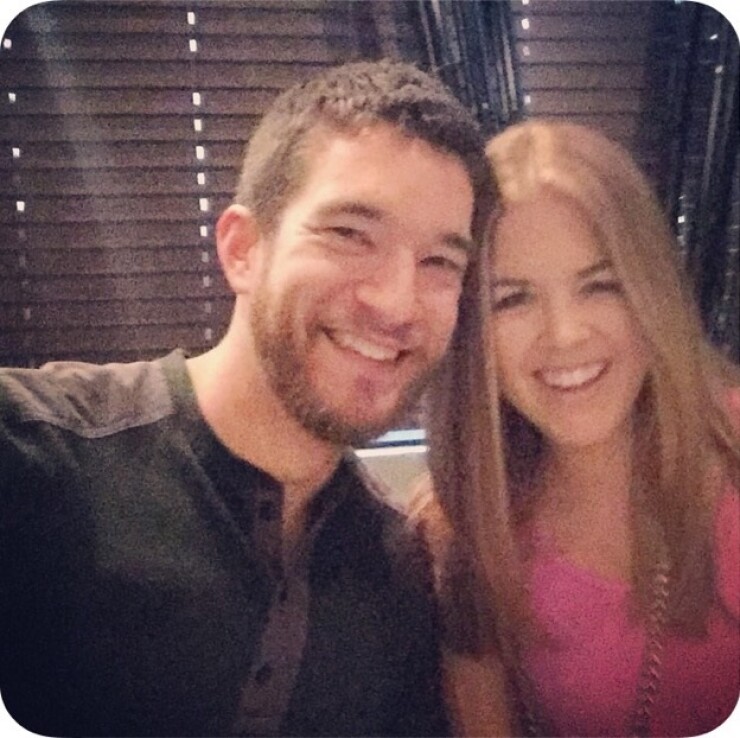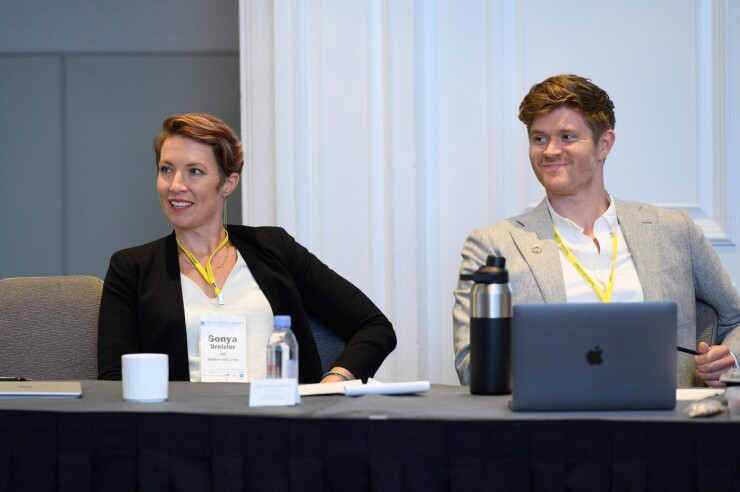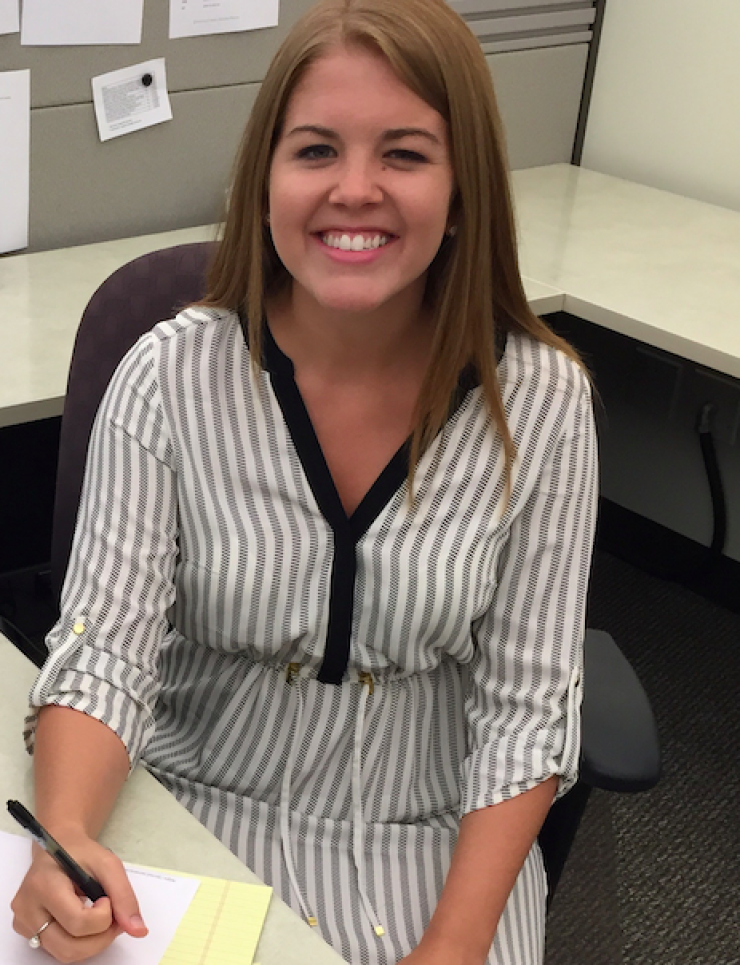Mary Carroll strolled past tables of revelers as the Barenaked Ladies delivered a staccato jam, spiced with their comedic rapping, onstage at TD Ameritrade’s National LINC conference for advisors in 2016. Frosted plastic balls filled with LED lights glowed in the dark, changing the colors of table centerpieces. Carroll, who now works for advisor billing firm AdvicePay, leaned in for a closer look at one.
As she did, the man she’d been dating for three months, Alan Moore, co-founder of XY Planning Network, was threading his way toward her through the crowd from the bar, carrying their drinks, one in each hand.
As he approached, a man came up behind Carroll and placed his hand just above her behind. The back of her hot pink shirt separated into a split seam that formed the shape of an inverted V.

“He proceeded to put his hand all the way up to her bra strap ... on her bare skin under her shirt,” Moore says.
“We both totally froze,” she says.
“I'm embarrassed to say it,” Moore says, but “I didn't know what to do. I was standing in a conference where I was an exhibitor, wearing an XYPN T-shirt. Could I throw a drink on him? Hit him?”
Overreacting risked making a bad impression on Carroll and might have gotten him evicted from the conference. “It would not have been a good look for a new boyfriend,” Moore says.
Thoughts along these lines raced through both of their minds. As the man attempted to engage Carroll in conversation, she stepped to the side and walked away with Moore. They never learned his identity.
“I ended up doing nothing,” Moore says. “I still am not sure if that was the right decision.”

‘WE NEED TO SLOW DOWN AND LISTEN’
The evening — and an earlier, far more serious alleged assault Carroll eventually confided to Moore — galvanized not only Moore, but also the company he founded with Michael Kitces, to try to curtail sexual predation in the industry. The next year, during their keynote talk at their annual conference, the co-founders announced a strict policy to counteract sexual harassment and discriminatory behavior at its events. They have mentioned it in their keynotes in the two years since.
Last year, the Financial Planning Association and
To that end, Dreizler has collected more than 40 stories from people, including Mary Moore, in an

“I’m writing [the stories] for people to read them and understand them and sit with them,” says Dreizler, adding that the series includes some of her own experiences. “We need to slow down and listen to women and believe them,” she says. The series does not identify any of the alleged predators, nor any of the storytellers, though some later identified themselves as contributing writers.
A third of women in a broad-based SourceMedia
After Dreizler’s series launched this month, Moore decided to post on Facebook that she had authored one of the accounts.
“This is how we will break the culture of sexual harassment,” says Mary Moore about why she is going public regarding the two incidents she says she experienced, one at the conference and one at a unrelated party earlier on that was attended by people in the industry.
At that party, Moore fell asleep on a couch after having a couple of strong drinks. She says she awoke to find a man on top of her, her underwear pushed aside and his fingers inside of her.
“I sat straight up and moved backwards,” she says. “That was when he stopped. … He mumbled, ‘Sorry,’ and ran from the room.”
IN THE WAKE OF #METOO
Going public with both incidents came out of a long-fought and deeply personal awakening, as Moore describes it, one that many other women throughout the country, and the world, are undergoing in the wake of the #MeToo movement that is empowering them to reframe and reconsider past abuse. And to insist on change.
Moore’s personal evolution from target of predation to outspoken advocate mirrors the kind of change that voices like Dreizler’s are calling for: They want blame placed where it belongs, on the shoulders of the predators, and lifted off of targets of abuse, where it often lands. To do so, individuals and companies need to wake up to the pervasiveness of the problem, Dreizler and Moore believe. Of paramount importance is listening to those who’ve experienced sexual assault and taking them seriously, they say.
People who encounter negative responses, including outright disbelief, when they recount abuse are at heightened risk for developing post-traumatic stress disorder and other health risks, according to a
The same night as the alleged assault as she slept on the couch, Moore sought out another woman in the industry and told her what had just happened.

“‘Oh, he wouldn’t do that,’” she recalls the woman saying, before adding that the man had a longtime girlfriend. “She just totally brushed it off.”
After that, Moore says, “I basically shut off” about the alleged assault. But her attempt to put the incident behind her, without facing and reckoning with its impact on her, set up an internal conflict. It proved impossible to put out of her mind.
“I experienced so many emotions,” she now says. “I blamed myself with it all: If I wouldn’t have had a drink at that party. If I wouldn’t have decided to stay. If I had decided to go home. If I wasn’t so stupid. I was just blaming myself about what happened.”
Months afterward, she and Alan Moore began dating. More than a year elapsed before she told him about that night. When she did, she brought the subject up in an off-handed manner, as if she expected to again be disbelieved. She got a very different reaction.
“He was mad for me. He was sad for me,” she says. “I felt so heard that what happened to me was awful [after] the first person I told totally dismissed it. … That was when I started to accept and not take blame for it. It was a really long process.”
Moore, who around that time had begun seeing a therapist, had yet to bring up the experience in her sessions, a not-uncommon phenomenon among sexual assault victims determined to leave the past behind them. Now, as she began to revisit that night in a therapeutic setting, she began to see what happened in an entirely new light.
“I’m to the point where I don’t take any responsibility for what happened,” she says. “I had been asleep, so there is no way I was consenting to that in any way.”
In the immediate wake of her subsequent encounter at the conference, her knee-jerk response was to blame herself in that instance as well. “I said to Alan, ‘I should never have worn this shirt to this convention,’ ” she recalls.
“You should be able to wear anything you want,” she recalls him replying.
Unlike many other companies that hold large events that have harassment policies, XY maintains an
“Need help?” it asks. “Complete the form on this page and an XYPN representative will respond with urgency.”
The page details behavior the company deems to be harassment, including unwanted sexual attention, offensive comments about gender, gender identity and expression, sexual images in public spaces, and stalking. The network reserves the right to expel attendees, including sponsors, in response, without refunds. It encourages people to call 911 when warranted.
“Remember alcohol is not an excuse!” the page says.
Many firms that hold industry conferences, including Schwab, Morningstar, Pershing and Fidelity, have harassment policies. But none said they have an online form conference attendees can use to report alleged abuse.
A spokesman for TD Ameritrade said the company had been unaware of Mary Moore’s experience four years ago.
“TD Ameritrade does not tolerate or condone this behavior, which is contrary to our core values and what we stand for,” spokesman Joseph Giannone said. “The safety and security of our event guests is top priority. We’re going to take this opportunity to review our event communications to ensure we send a strong message about our policies and expectations.”
Dreizler says two other major conference organizers, neither of which she was at liberty to identify, have said they are considering new policies.
A WITNESS TO FISHER’S REMARKS
That people are paying attention to their stories — amid media coverage, Twitter conversations and other people contacting them directly to share their experiences — is a relief to both Dreizler and Moore. Both overcame their own strong reluctance to share their experiences publicly.
“One of the reasons it’s taken me so long to put it out is fear on my part,” Dreizler says. “One is fear of negative backlash, personal and professional, and the other fear is that I would be yelling into the void and that nobody would care. Or the only people who would care are the victims. That is such a frustrating feeling.”
Dreizler happened to attend the Tiburon CEO Summit earlier this month when Ken Fisher, founder of Fisher Investments,
Dreizler says she no longer wants to talk about Fisher; instead, she wants to give people like Mary Moore the floor. “Women want to be heard,” she says.
Planner and New York Times contributor Carl Richards echoed that theme this month on Twitter, urging people to ask women about their experiences in the industry and take the time to hear them out.
In explaining why via a Tweet, Richards offered up the following reasons, “1. There is a TON of pain out there. 2. There is a TON of pain out there. 3. There is a TON of pain out there. (Sorry … that was a bit annoying, but it’s that important.)”
Moore, now 25, calls the memory of the night at the party where she says she was sexually assaulted while asleep as a “painful thing you carry with you.” When she learned she was pregnant with her daughter, Ada, in November 2017, the pain rose up again.
By that December, she says, “I just remember feeling so devastated about what I had been through. I was so mad.”
As Ada, who would be born the following July, grew inside of her, the jumble of her conflicting emotions hardened into resolve. “I was thinking about all the ways I could protect my kids,” Moore says. “I started wanting to share my story.”





